初中英语知识框架
(完整word版)初中英语语法大框架.pdf

简单介词、从属连词
表示说话时的感 情或口气
句类 句子种类 (Sentence Types )
名称
定义
陈述 句
说明一个事实或陈述说话人的看 法
疑问 提出问题 句
祈使 表示请求、命令、劝告、建议等 句
感叹 句
表示喜怒哀乐等强烈的情感
简单 句
只有一套主、谓语的句子
并列 句
由两个及以上并列而又互相独立 的简单句构成
复合 由一个主句和至少一个从句构成 句
分类 肯定句、否定句 一般疑问句、选择疑问句、反意疑问句、 特殊疑问句等
主语从句、表语从句、宾语从句、定语从 句、状语从句等
(conjunction) 独 立 担 任 任 感叹词 interj. 何 (interjection) 成 分)
词类 ( Parts of Speech )
定义 表示人或事物的 名称 代替名词、形容词 或数词
表示数量或顺序
专有名词、普通名词
分类
人称代词、物主代词、反身代词、相互代词、指示 代词、疑问代词、不定代词、关系代词、连接代词 基数词、序数词
词类和句类
词类
汉(英)语名称
名词 n. (noun) 实 词 代词 pron. (在 (pronoun) 句 数词 num. 子 (numeral) 中 独 动词 v. (verb) 立 形容词 adj. 担 (adjective) 任 成 分) 副词 adv. (adverb)
虚 冠词 art. (article) 词 (不 能 介词 prep. 在 (preposition) 句 子 连词 conj. 中
表示动作或状态
表示名词 (人或物 ) 的特征 修饰动词、形容 词、其他副词或全 句,表示状态特征 或行为
(完整word版)仁爱版初中英语目录知识框架,2017
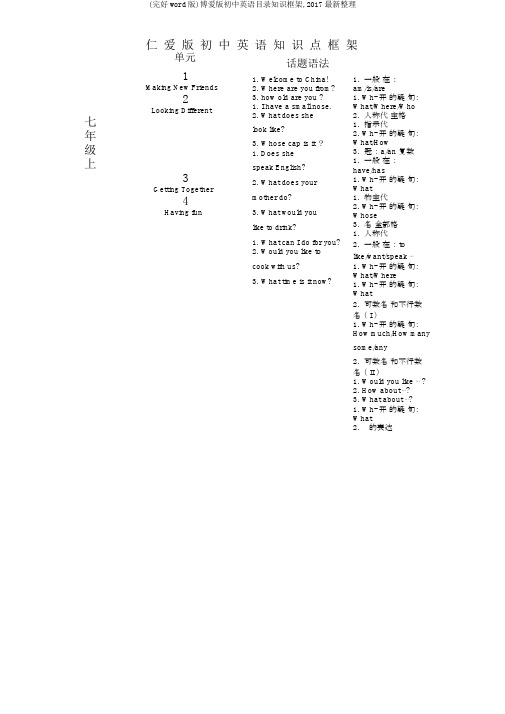
仁爱版初中英语知识点框架单元话题语法1Making New Friends2Looking Different 七年级上3Getting Together4Having fun 1.Welcome to China!2.Where are you from?3.how old are you ?1.I have a small nose.2.What does shelook like?3.Whose cap is it ?1.Does shespeak English?2.What does yourmother do?3.What would youlike to drink?1.What can I do for you?2.Would you like tocook with us?3.What time is it now?1.一般在:am/is/are1.Wh- 开的疑句:What/Where/Who2.人称代主格1.指示代2.Wh- 开的疑句:What/How3.冠: a/an 复数1.一般在:have/has1.Wh- 开的疑句:What1.物主代2.Wh- 开的疑句:Whose3.名全部格1.人称代2.一般在: tolike/want/speak ⋯1.Wh- 开的疑句:What/Where1.Wh- 开的疑句:What2.可数名和不行数名( I )1.Wh- 开的疑句:How much/How manysome/any2.可数名和不行数名( II )1.Would you like ⋯ ?2.How about ⋯?3.What about ⋯?1.Wh- 开的疑句:What2.的表达单元话题语法1. I usually come to1. 率school by subway?5 2. A few students arerunning around the 1. 在行Our School Life playground.3. My school life is very 1. 一般在interesting. 2. 在行1. there is a study next to 1. There is/aremy bedroom. 2. 介6 2. my home is in an1. There is/areapartment building.七Our Local Area年 3.how can I get to the 1. 介级library? 2. 祈使句1. 一般去( I)下 1. When is your 2. 基数birthday?3. 序数7 2. Can you sing an 1. 情: can/can'tcould/couldn'tEnglish song?The Birthday Party 2. 疑句3. everyone had a good1.一般去( II )time.1. What's the weather 1. 一般在2. 一般去like in spring?3. 构法8 2. The summer holidays 1.Want/plan/wish/hope/w The Seasons and the Weatherare coming. ould like to ⋯3. Let's celebrate!1. 复单元1Playing Sports2八Keeping Healthy年级上3Our Hobbies4Our World话题语法1. I am going to play 1. Be going to 构造的一basketball. 般未来时2. I will kick you the ball 1. Would/Do you mind again. doing sth?3. the school sports meet 1. Will 构造的一般未来is coming. 时1. You should brush your1. 神态动词( 1)teeth twice a day.2. I must ask him to give1. 神态动词( 2)up smoking.3. Must we do exercise to 1. 神态动词( 3)prevent the flu? 2. 反身代词1. What is your hobby? 1. Used to 过去经常2. What sweet music! 1. 叹息句3. What were you doing1. 过去进行时at this time yesterday?1. what is the strongest 1. 形容词的比较级和最animal on the farm? 高级2. how can we protect1. 形容词的比较级和最ourselves from the高级earthquake?3. The internet makes the1. 宾语补足语world smaller.单元话题语法1. you look excited. 1. 系 +形容5 2. I am feeling better 1. 原由状从句Feeling Excitednow. 2. 同比3. Many things can affect 1. 6 种句型our feelings.1. We're going on a 1. 不定式spring field trip.6 2. How about exploring 八Enjoying Cycling the tianmen Square?年 3. Bicycle riding is good 级exercise.下 1. We are preparing for afood festival7 2. I am not sure whether IFood Festivalcan cook it well.3. I cooked the mostsuccessfully.1. we will have a classfashion show.8 2. we can design our ownOur Clothesuniforms.3. he said the fashionshow was wonderful. 1.状从句1.条件状从句1.从句( I )1.从句( II )2.的比和最高( I )1.的比和最高( II )1.So⋯ that⋯2.So that⋯3.Such⋯ that⋯1.从句( III )1. 从句( IV )单元话题语法1The Changing World九2 Saving the Earth年级上3English around the World4Amazing Science 1.Our country hasdeveloped rapidly.2.The population indeveloping countries isgrowing faster.3.The world has changedfor the better.1.Pollution has causedtoo many problems.2.All these problems arevery serious.3.what can we do athome to protectthe environment ?1.English is widelyspoken throughoutthe world.2.some things usuallyhave different meaningsin different cultures.3.Could you give ussome advice on howto learn English well?1.When was it invented?2.I am excited aboutthe things that will bediscovered in the future.3.China is the thirdnation that sent aperson into space.1.在达成( I )Have/has done⋯Have/has been to⋯Have/has gone to⋯1.在达成( II )Already, yet, just, ever,never1.在达成( III )For, since2.构法1.直接引和接引1.不定代和副1.并列复合句 or, and,while, but1.被( I)am/is/are+ 去分1.在行表未来1. Wh-+to do1.被( II )was/were+ 去分1.被( III )will+be+ 去分1.定从句That/which/who单元5China and the world 九年级下6Entertainment andFriendship话题语法1. China attracts millions1. 定从句( I) that, of tourists from all overwhichthe world.2. He is really the pride 1. 定从句( II )of china. Who, whom, whose1. 接和主一致3. Now it is a symbol ofEither ⋯ or⋯Both ⋯ and⋯England.Neither ⋯ nor⋯Not only ⋯ but also⋯1. I would rather watchsports shows than thoseones.2. Who is your favoritecharacter in literature?3. I will remember ourfriendship forever.。
初中英语知识框架体系及中考英语考点分布

初中英语知识框架体系及中考英语考点分布第一部分新目标英语教材知识一览表初中(新目标)英语全程一览表第二部分初中英语语法项目一览表第三部分新目标英语各年级重点内容概览《英语(新目标)》教材重点句型、短语一览表*标记为听力材料语句七年级(上册)(Starter)Unit 1 Good morning!Ⅰ. Sentences:1. Good morning, Alice! 早上好,艾丽斯!2. Good morning, Cindy! 早上好,辛蒂!3. Hello, Frank! 你好,弗兰克!4. Hi, Cindy! How are you? 嗨,辛蒂!你好吗?I’m fine, thanks. 我很好,非常感谢。
5. Good afternoon, Eric! 下午好,埃里克!6. Good evening, Alice! 下午好,艾丽斯!7. I’m OK. 我还不错。
/我很好。
I’m = I am 我是(Starter) Unit 2 What’s this in English?Ⅰ、Useful expressions:1. in English 用英语(说),在英语方面2. an orange一个桔子Ⅱ、Sentences:1. What’s this in English? 用英语说这是什么?It’s a key. 这(它)是一把钥匙。
2. Spell it, please. 请拼读一下它。
K-E-Y. K-E-Y.what’s = what is 是什么it’s = it is 它(这,那)是(Starter) Unit 3 What color is it?Ⅰ、Useful expressions:1. A in Grace 格雷斯中的AⅡ、Sentences:1. What’s this? 这是什么?It’s V. 这是V。
2. What color is it? 它是什么颜色?It’s red. 它是红色的。
初中英语知识框架结构

成的 固定 be +形容词+动词
短语
定义
时间副词
地点副词
方式副词
分类
专题六 副词
程度副词 频率副词 疑问副词
功能 位置
其他副词
主格
宾格 形容词性物主代词 名词性物主代词 第一人称反身代词 第二人称反身代词 第三人称反身代词 this that these those 普通的不定代词 个体不定代词 数量不定代词 (who whom whose what which) who whose whom that which…) each other ,one another)
情态动词是历年中考的测试点之一, 主要以单选题,完形填空题形式出 现,经常考查的内容有:情态动词的 意义和用法。情态动词表示推测和可 能。情态动词引出的一般疑问句的回 答。
第 4 页,共 7 页
used to
意为“过去常常”,表示 过去的动作,行为
基本概念
反意疑问 句的构成
基本形式
主语,谓语的确定
被动语态在近几年的考题中频繁出 现,测试内容主要包括一般现在时, 一般过去时,现在完成时态的被动语 态和含有情态动词的被动语态。测试 的题型主要以单选题和完形填空等形 式出现
在动词不定式,现在分词和过去分词 中,对不定式和现在分词的考查最 多,尤其是不定式的否定形式,省去 TO和不省去TO的情况,及只能用ving 形式作宾语的情况。在具体的语境中 考查非谓语动词的用法。
由普通名称构成的专有名
次前加the
the +形容词表示一类人
固定搭配中的定冠词
不用冠词 的场合
规则构成 不规则构成 规则构成 不规则构成 与冠词连用的不同意 义 构成 读法 构成 读法
初中英语知识框架结构按单元

初中英语知识框架结构按单元初中英语通常分为七、八、九三个年级。
每个年级分为若干个单元,每个单元有一个主题,涵盖了一定的语法、词汇和语音知识。
以下是初中英语常见的知识框架结构按单元划分。
七年级:1. Unit 1: Introduction- Greetings- Classroom language- Personal information- Numbers- Pronunciation: vowels and consonants2. Unit 2: Hobbies and Interests- Likes and dislikes- Leisure activities- Present simple tense- Countable and uncountable nouns3. Unit 3: Family and Friends- Family members- Relationships- Physical appearance- Present continuous tense- Adjectives to describe people4. Unit 4: School Life- School subjects- School facilities- Daily routines- Adverbs of frequency5. Unit 5: Holidays and Travel- Public holidays- Travel destinations- Means of transportation- Past simple tense- Regular and irregular verbs 八年级:1. Unit 1: Daily Life- Daily activities- Chores and responsibilities- Time expressions- Present perfect tense- Adverbs and adverbial phrases 2. Unit 2: Health and Fitness- Physical and mental health- Sports and exercises- Healthy habits- Modals: can, could, should, must 3. Unit 3: Technology and Media- Internet and social media- Television and movies- Future tense- Conditional sentences4. Unit 4: Shopping and Money- Shopping vocabulary- Types of stores- How to bargain- Money and currency- Indirect speech5. Unit 5: Food and Nutrition- Food and drinks- Eating habits- Nutritional values- Imperatives- Phrasal verbs九年级:1. Unit 1: Environment and Nature- Environmental issues- Pollution and conservation- Endangered species- Passive voice- Gerunds and infinitives2. Unit 2: Jobs and Careers- Job titles and descriptions- Work skills- Job interview preparation- Object pronouns- Reported speech3. Unit 3: World Cultures- Cultural diversity- Festivals and traditions- Customs and etiquette- Relative clauses- Modal verbs review4. Unit 4: Science and Technology- Scientific discoveries- Inventions and innovations- Robotics and artificial intelligence- Passive voice review- Conditional sentences review5. Unit 5: Literature and Arts- Literary genres- Famous writers and artists- Elements of storytelling- Advanced grammar review- Vocabulary expansion以上是初中英语常见的知识框架结构按单元划分,每个单元覆盖了一定的语法、词汇和语音知识,供学生逐步学习。
初中英语知识点总结框架图

初中英语知识点总结框架图一、英语基础知识1. 字母表- 大写字母和小写字母- 字母的读音和书写规则2. 语音知识- 音素和音标- 元音和辅音的分类- 连读、失爆和同化现象3. 词汇- 单词的构成:词根、前缀、后缀- 常用词汇分类:名词、动词、形容词、副词、介词、连词等- 同义词、反义词和短语动词4. 语法- 句子结构:主语、谓语、宾语、定语、状语- 时态:一般现在时、一般过去时、现在进行时、过去进行时、一般将来时、现在完成时- 语态:主动语态和被动语态- 非谓语动词:动名词、分词(现在分词和过去分词)、不定式 - 情态动词- 代词的用法:人称代词、物主代词、反身代词、指示代词、疑问代词、不定代词- 冠词的使用:定冠词和不定冠词- 介词的用法:时间介词、地点介词、方向介词、其他介词- 连词的分类和用法:并列连词、从属连词- 句子类型:陈述句、疑问句、祈使句、感叹句 - 特殊句式:倒装句、省略句二、英语听说读写技能1. 听力- 听力材料的类型和特点- 听力技巧:预测、捕捉关键信息、理解语境- 听力练习方法:听写、跟读、摘要2. 口语- 发音规则和技巧- 口语表达的常用句型- 口语练习方法:角色扮演、情景对话、演讲3. 阅读- 阅读材料的类型和特点- 阅读技巧:扫读、略读、精读- 阅读理解策略:主旨大意、细节理解、推理判断 - 阅读练习方法:速读、词汇积累、文化背景了解4. 写作- 写作类型:记叙文、议论文、说明文、应用文 - 写作结构:引言、正文、结尾- 写作技巧:主题句的使用、段落发展、过渡词汇 - 写作练习方法:日记、读书笔记、模拟写作三、英语文化与交际1. 英语国家的文化习俗- 节日和庆典- 饮食习惯- 礼仪和行为规范2. 英语交际用语- 问候和告别- 邀请和应答- 道歉和表达感谢- 请求帮助和提供帮助- 表达意见和看法3. 跨文化交际- 文化差异的认识和尊重- 非语言交际的重要性- 跨文化沟通的技巧和策略四、英语学习策略与资源1. 学习策略- 制定学习计划和目标- 有效的记忆方法- 自我激励和时间管理2. 学习资源- 教材和参考书- 网络资源:在线课程、学习软件、教育网站- 多媒体资源:英文歌曲、电影、电视节目、播客3. 学习评估- 定期自我检测和评估- 参加模拟考试和真实考试- 反馈和调整学习策略通过以上的框架图,学生可以系统地掌握初中英语的知识点,为进一步的英语学习打下坚实的基础。
初中英语知识框架体系和中考英语考点分布

初中英语知识框架体系及中考英语考点分布第一部分新目标英语教材知识一览表初中(新目标)英语全程一览表预备篇Unit Title Topic FunctionsUnit 1 Good morning! Meeting friends Greet peopleUnit 2 What’s this in English?Things around you Identify thingsSpell wordsUnit 3 What color is it? Colors Identify colors七年级上Unit 1 My name’s Gina.Making new friends Introduce yourselfGreet peopleAsk for and give telephonenumbersUnit 2 Is this your pencil? Things in the classroom Identify ownershipUnit 3 This is my sister. The family Introduce peopleIdentify peopleUnit 4 Where’s my backpack?Things around the house Talk about where things areUnit 5 Do you have a soccer ball? Spending time withfriends Talk about ownership Make suggestionsUnit 6 Do you like bananas? Food Talk about likes and dislikes Unit 7 How much are these pants? Shopping Ask about pricesTalk about clothingThank someoneUnit 8 When is your birthday? Dates Talk about datesUnit 9 Do you want to go to a movie? Movies Talk about preferencesMake plansUnit10Can you play the guitar? Joining a club Talk about abilitiesUnit 11 What time do you go to school? Daily routines Talk about daily routinesAsk about and say timesUnit 12 My favorite subject isscience.School subjects Talk about preferencesGive reasons七年级下Unit 1 Where’s your pen pal from?Countries, nationalitiesand languages Talk about countries nationalities and languages Ask and tell where people liveUnit 2 Where’s the post office?The neighborhood Ask for and give directionson the streetUnit 3 Why do you like koalas? Animals in a zoo Describe animalsExpress preferencesUnit 4 I want to be an actor. Occupations Talk about jobsUnit 5 I’m watching TV.Everyday activities Talk about what people aredoingUnit 6 It’s raining!The weather Describe the weatherDescribe what you are doing Unit 7 What does he look like? Physical appearance Describe people’s looks Unit 8 I’d like some noodles.Food Order foodUnit 9 How was your weekend? Weekend activities Talk about recent pasteventsUnit10Where did you go on vacation? Holidays and vacations Talk about past eventsUnit 11 What do you think of gameshows?Popular culture Give opinionsTalk about likes anddislikesUnit12Don’t eat in class.Rules Talk about rules八年级上Unit 1 How often do you exercise? Free time activities Talk about how often you dothingsUnit 2 What’s the matter?Health Talk about your healthGive adviceUnit 3 What are you doing forvacation?Vacation plans Talk about future plansUnit 4 How do you get to school? Transportation Talk about how to get toplacesUnit 5 Can you come to my party? Invitation Make.accept and declineinvitationsTalk about obligationsUnit 6 I’m more outgoing than my sister. Personal traits Talk about personal traitsCompare peopleUnit 7 How do you make a banana milk shake? Cooking at home Describe a processFollow instructionsUnit 8 How was your school trip? School trips Talk about events in the past Unit 9 When was he born? People we admire Talk about famous peopleUnit 10 I’m going to be a basketballplayer.Life goals Talk about future intentionsUnit 11 Could you please clean yourroom?Chores Make polite requestsAsk for permissionUnit 12 What’s the best radiostation?Your town Discuss preferencesMake comparisons八年级下Unit 1 Will people have robots? Opinions Make predictions Unit 2 What should I do? Advice Talk about problemsGive adviceUnit 3 What were you doing when the UFO arrived? Interesting events Talk about past eventsTalk a storyUnit 4 He said I was hard-working. Telling a story Report what someone said Unit5 If you go to the party, you’llhave a great time!Decision making Talk about consequencesUnit 6 How long have you been collecting shells? Hobbies Talk about how long you havebeen doing thingsUnit 7 Would you mind turning down the music? Complaints Make requestsApologizeUnit 8 Why don’t you get her a scarf?Gift giving Compare qualitiesGive adviceUnit 9 Have you ever been to anamusement park?Fun places Talk about past experiencesUnit10It’s a nice day, isn’t it?Small talk Make small talk九年级Unit 1 How do you study for a test? Learning how to learn Talk about how to studyUnit 2 I used to be afraid of the dark. How we have changed Talk about what you used tobe likeUnit 3 Teenagers should be allowed to choose their own clothes. Rules Talk about what you areallowed to doAgree and disagreeUnit 4 What would you do? Interesting andembarrassing situations Talk about imaginary situationsUnit 5 It must belong to Carla. A picnic Make inferencesUnit 6 I like music that I can danceto.Music Express preferencesUnit 7 Where would you like to visit? vacations Talk about places you wouldlike to visitUnit 8 I’ll help clean up the cityparks.volunteering Offer helpUnit 9 When was it invented? inventions Talk about the history ofinventionsUnit 10 By the time I got outside, thebus had already left.Bad days Narrate past eventsUnit 11 Could you please tell me wherethe restrooms are?Getting around Ask for information politelyUnit 12 You’re supposed to shakehands.Customs Tell what you are supposed todoUnit 13 Rainy days make me sad. Feelings Talk about how things affectyouUnit14Have you packed yet? Preparing for a vacation Talk about recent eventsUnit 15 We’re trying to save themanatees!Protecting theenvironmentDebate an issue 第二部分初中英语语法项目一览表目构成用法象征词规则变化不规则变化例时动词用原形三人称单数-s / es表示经常性的动作或状态Every often always on天 in月、季、节、年。
初中英语知识框架体系及中考英语考点分布

初中英语知识框架体系及中考英语考点分布第一部分新目标英语教材知识一览表初中(新目标)英语全程一览表第二部分初中英语语法项目一览表第三部分新目标英语各年级重点内容概览《英语(新目标)》教材重点句型、短语一览表*标记为听力材料语句七年级(上册)(Starter)Unit 1 Good morning!Ⅰ. Sentences:1. Good morning, Alice! 早上好,艾丽斯!2. Good morning, Cindy! 早上好,辛蒂!3. Hello, Frank! 你好,弗兰克!4. Hi, Cindy! How are you? 嗨,辛蒂!你好吗?I’m fine, thanks. 我很好,非常感谢。
5. Good afternoon, Eric! 下午好,埃里克!6. Good evening, Alice! 下午好,艾丽斯!7. I’m OK. 我还不错。
/我很好。
I’m = I am 我是(Starter) Unit 2 What’s this in English?Ⅰ、Useful expressions:1. in English 用英语(说),在英语方面2. an orange一个桔子Ⅱ、Sentences:1. What’s this in English? 用英语说这是什么?It’s a key. 这(它)是一把钥匙。
2. Spell it, please. 请拼读一下它。
K-E-Y. K-E-Y.what’s = what is 是什么it’s = it is 它(这,那)是(Starter) Unit 3 What color is it?Ⅰ、Useful expressions:1. A in Grace 格雷斯中的AⅡ、Sentences:1. What’s this? 这是什么?It’s V. 这是V。
2. What color is it? 它是什么颜色?It’s red. 它是红色的。
初中英语知识框架
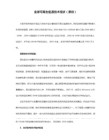
现在完成时及现在完成进行时
Unit 7 Would you mind turning down the music?
Get_的用法
如何写英文请假条、便条和卡片
英语礼貌用语表达
Unit 8 Why don’t you get her a scarf?
中国地址的英文书写格式
Unit 7 What does he look like?
句型
形容人品质的英语单词
Unit 8 I ’d like some noodles.
I`d like句型
食物英语单词大全
询问价格的表达方式
Unit 9 How was your weekend?
英文邀请函
Unit 6 I’m more outgoing than my sisiter.
初中英语形容词比较级和最高级讲解
英语人物性格形容词
Unit 7 How do you make a banana milk shake?
可数不可数名词
可数名词的复数变化
what time与when的区别
频度副词的用法
Unit 12 Don’t eat in class.
各种特殊疑问句
描述性格的形容词
一周七天的英语表达
七年级下册
Unit 1 Where’s your pen pal
国家英语
英语作文_地点专题
do引导的一般疑问句
球类英语
单词三单动词的变化规则
Unit 6 Do you like bananas?
like的用法
单数可数名词变复数名词规则
初中英语知识框架结构按单元
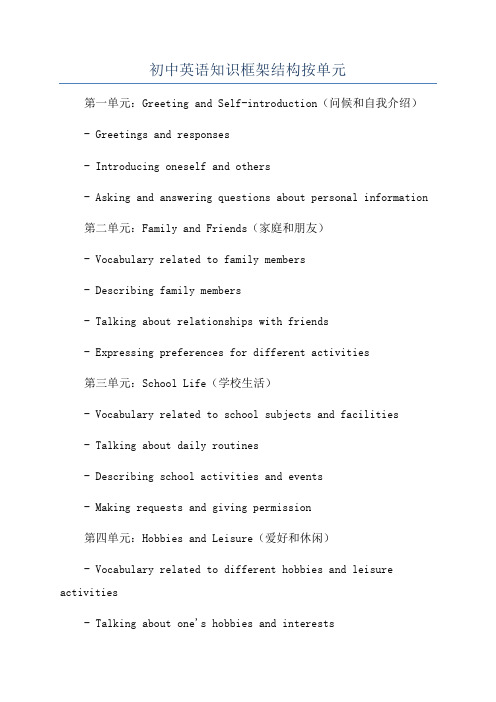
初中英语知识框架结构按单元第一单元:Greeting and Self-introduction(问候和自我介绍)- Greetings and responses- Introducing oneself and others- Asking and answering questions about personal information 第二单元:Family and Friends(家庭和朋友)- Vocabulary related to family members- Describing family members- Talking about relationships with friends- Expressing preferences for different activities第三单元:School Life(学校生活)- Vocabulary related to school subjects and facilities- Talking about daily routines- Describing school activities and events- Making requests and giving permission第四单元:Hobbies and Leisure(爱好和休闲)- Vocabulary related to different hobbies and leisure activities- Talking about one's hobbies and interests- Expressing likes and dislikes第五单元:Healthy Lifestyle(健康生活方式)- Vocabulary related to healthy habits and routines- Talking about healthy eating habits- Describing sports and exercises- Giving advice on maintaining a healthy lifestyle第六单元:Travel and Transportation(旅行和交通)- Vocabulary related to travel and transportation- Describing different modes of transportation- Talking about travel experiences- Giving and following directions第七单元:Weather and Seasons(天气和季节)- Vocabulary related to different weather patterns and seasons- Describing the weather in different seasons- Talking about different activities in different weather conditions- Expressing preferences for certain weather conditions第八单元:Shopping(购物)- Vocabulary related to different stores and shopping items - Describing shopping experiences- Expressing preferences for different brands and products - Making purchases and asking for discounts第九单元:Daily Life(日常生活)- Vocabulary related to daily activities and household chores- Talking about daily routines and responsibilities- Describing household items and appliances- Giving and following instructions- Talking about the advantages and disadvantages of technology- Expressing opinions on social media and online activities 以上就是初中英语知识框架结构按单元的大致内容,每个单元都涵盖了相关的词汇、句型和表达方式。
初中英语知识点框架

初中英语知识点框架初中英语的学习内容广泛,涵盖了词汇、语法、句型、阅读、写作、听力和口语等多个方面。
以下是初中英语知识点的框架:1. 词汇学习:- 基础词汇:学习日常生活相关的基础词汇,如颜色、数字、家庭成员、日常用品等。
- 学科词汇:学习各个学科的专业词汇,如数学、科学、历史等。
- 情感表达词汇:学习表达喜怒哀乐等情感的词汇。
2. 语法知识:- 名词:包括单复数、所有格等。
- 动词:时态(一般现在时、过去时、将来时等)、语态(主动语态、被动语态)、非谓语动词(动名词、不定式、分词)。
- 形容词和副词:比较级和最高级、形容词和副词的用法。
- 代词:人称代词、物主代词、指示代词等。
- 介词:介词的用法和固定搭配。
- 连词:并列连词、从属连词等。
- 句型结构:简单句、并列句、复合句。
3. 句型和表达:- 陈述句:表达事实或观点。
- 疑问句:一般疑问句、特殊疑问句、选择疑问句等。
- 祈使句:表达请求或命令。
- 感叹句:表达强烈的情感。
4. 阅读理解:- 理解文章主旨大意。
- 识别文章结构和逻辑关系。
- 推断词义和隐含意义。
5. 写作技巧:- 描述性写作:描述人、物、地点等。
- 叙述性写作:叙述事件或经历。
- 议论性写作:表达观点和论证。
6. 听力理解:- 捕捉关键信息。
- 理解对话或独白的主旨。
- 推断说话人意图和情感。
7. 口语交流:- 日常对话:问候、介绍、询问信息等。
- 讨论和辩论:表达观点、反驳和论证。
- 演讲和陈述:清晰、有逻辑地表达自己的想法。
8. 文化知识:- 了解英语国家的文化习俗。
- 学习与文化相关的表达和习语。
9. 学习策略:- 记忆技巧:如联想记忆、分类记忆等。
- 学习计划:合理安排学习时间和内容。
- 自我检测:定期进行自我测试,评估学习效果。
初中英语学习是一个循序渐进的过程,需要学生在老师的指导下,不断积累知识,提高语言运用能力。
系统整理初中英语语法知识框架

系统整理初中英语语法知识框架初中英语语法知识是学习英语的基础,掌握好语法知识对于提高英语水平至关重要。
本文将从基础语法知识、句子结构、时态和语态、从句和虚拟语气等方面进行系统整理,帮助读者建立起初中英语语法知识的框架。
一、基础语法知识1. 词性:英语中的词性包括名词、动词、形容词、副词、代词、连词、介词和冠词等。
名词用来表示人、事物和概念,动词用来表示动作或状态,形容词用来描述名词的特征,副词用来修饰动词、形容词或其他副词,代词用来代替名词,连词用来连接句子或词语,介词用来表示位置、方向、时间等关系,冠词用来限定名词的范围。
2. 句子成分:英语句子由主语、谓语和宾语构成。
主语一般是句子的主题,谓语表示主语的动作或状态,宾语表示动作的承受者或影响者。
另外,还有定语、状语和补语等句子成分,分别用来修饰名词、动词或形容词。
二、句子结构1. 简单句:由一个主语和一个谓语构成的句子称为简单句。
例如:“I like English.”(我喜欢英语。
)2. 并列句:由两个或多个简单句用并列连词连接而成的句子称为并列句。
例如:“I like English and he likes math.”(我喜欢英语,他喜欢数学。
)3. 复合句:由一个主句和一个或多个从句构成的句子称为复合句。
例如:“Iwill go to the park if it doesn't rain.”(如果不下雨,我会去公园。
)三、时态和语态1. 时态:英语中的时态包括一般现在时、一般过去时、一般将来时等。
一般现在时用来表示经常性或普遍性的动作或状态,一般过去时用来表示过去的动作或状态,一般将来时用来表示将来的动作或状态。
2. 语态:英语中的语态包括主动语态和被动语态。
主动语态表示主语是动作的执行者,被动语态表示主语是动作的承受者。
例如:“He broke the window.”(他打破了窗户。
)(主动语态)“The window was broken by him.”(窗户被他打破了。
初中英语语法核心(英语学习框架)
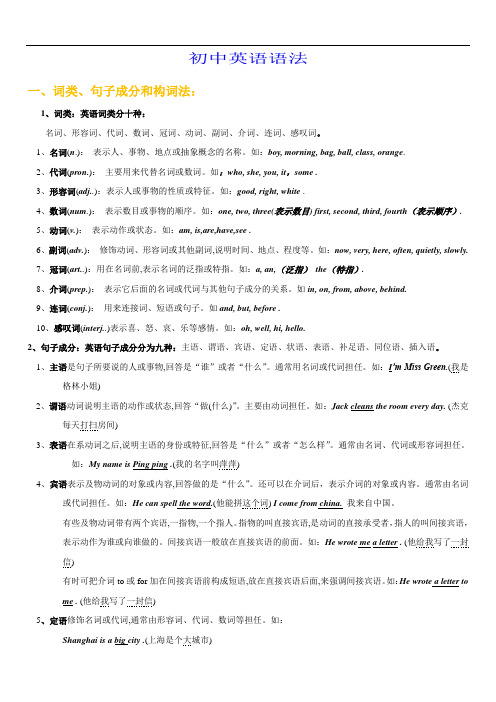
初中英语语法一、词类、句子成分和构词法:1、词类:英语词类分十种:名词、形容词、代词、数词、冠词、动词、副词、介词、连词、感叹词。
1、名词(n.):表示人、事物、地点或抽象概念的名称。
如:boy, morning, bag, ball, class, orange.2、代词(pron.):主要用来代替名词或数词。
如:who, she, you, it,some .3、形容词(adj..):表示人或事物的性质或特征。
如:good, right, white .4、数词(num.):表示数目或事物的顺序。
如:one, two, three(表示数目) first, second, third, fourth(表示顺序).5、动词(v.):表示动作或状态。
如:am, is,are,have,see .6、副词(adv.):修饰动词、形容词或其他副词,说明时间、地点、程度等。
如:now, very, here, often, quietly, slowly.7、冠词(art..):用在名词前,表示名词的泛指或特指。
如:a, an,(泛指)the(特指).8、介词(prep.):表示它后面的名词或代词与其他句子成分的关系。
如in, on, from, above, behind.9、连词(conj.):用来连接词、短语或句子。
如and, but, before .10、感叹词(interj..)表示喜、怒、哀、乐等感情。
如:oh, well, hi, hello.2、句子成分:英语句子成分分为九种:主语、谓语、宾语、定语、状语、表语、补足语、同位语、插入语。
1、主语是句子所要说的人或事物,回答是“谁”或者“什么”。
通常用名词或代词担任。
如:I’m Miss Green.(我是格林小姐)2、谓语动词说明主语的动作或状态,回答“做(什么)”。
主要由动词担任。
如:Jack cleans the room every day. (杰克每天打扫房间)3、表语在系动词之后,说明主语的身份或特征,回答是“什么”或者“怎么样”。
初中英语知识框架结构
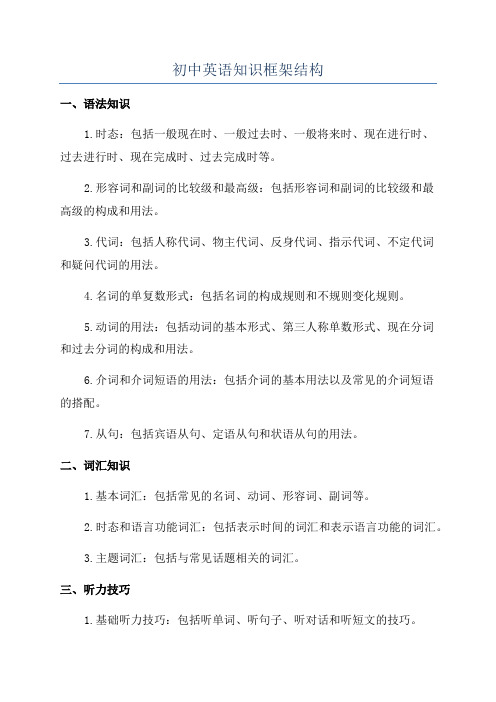
初中英语知识框架结构一、语法知识1.时态:包括一般现在时、一般过去时、一般将来时、现在进行时、过去进行时、现在完成时、过去完成时等。
2.形容词和副词的比较级和最高级:包括形容词和副词的比较级和最高级的构成和用法。
3.代词:包括人称代词、物主代词、反身代词、指示代词、不定代词和疑问代词的用法。
4.名词的单复数形式:包括名词的构成规则和不规则变化规则。
5.动词的用法:包括动词的基本形式、第三人称单数形式、现在分词和过去分词的构成和用法。
6.介词和介词短语的用法:包括介词的基本用法以及常见的介词短语的搭配。
7.从句:包括宾语从句、定语从句和状语从句的用法。
二、词汇知识1.基本词汇:包括常见的名词、动词、形容词、副词等。
2.时态和语言功能词汇:包括表示时间的词汇和表示语言功能的词汇。
3.主题词汇:包括与常见话题相关的词汇。
三、听力技巧1.基础听力技巧:包括听单词、听句子、听对话和听短文的技巧。
2.听力策略:包括预测信息、捕捉关键词和通过上下文理解等策略。
四、口语表达1.基本口语表达:包括问候、自我介绍、表达喜好和兴趣等基本口语表达。
2.交际用语和口语情景:包括在不同口语情景中使用的交际用语和常见的口语情景。
五、阅读理解1.简单的阅读理解:包括理解文章的主题、概括文章的主要内容和回答简单问题等。
2.细节的阅读理解:包括回答细节问题、填写信息表和选择正确答案等。
六、写作技巧1.基础写作技巧:包括书写规范、用词准确、句子连贯和段落结构等基础写作技巧。
2.句子写作:包括构建简单句、并列句和复合句等句子写作技巧。
3.短文写作:包括表达观点、论证观点和提出建议等短文写作技巧。
初中英语知识框架结构

初中英语知识框架结构
一、基础知识
1.学习英语的重要性和好处
2.英语的语种、使用地区和国际地位
3.英语的基本音标和发音规则
4.英语的基本字母表和拼读规则
5.英语的基本语序和句型结构
6.英语的基本语法和句子成分
二、基本语法
1.名词的分类和用法
2.代词的分类和用法
3.形容词的分类和用法
4.动词的时态和语态
5.副词的分类和用法
6.介词的分类和用法
7.冠词的分类和用法
8.数词的分类和用法
9.情态动词和情态副词的用法
三、词汇积累
1.常用基础词汇的掌握和积累
2.同义词、反义词和近义词的识别和运用
3.前缀、后缀和词根的词义辨析和构词规则
4.高频词汇的背诵和运用
5.词汇的记忆技巧和方法
四、阅读技巧
1.阅读理解的基本技巧和方法
2.阅读材料的分类和选择
3.阅读材料的主旨和要点的把握
4.阅读材料的关键信息和细节的辨认
5.阅读材料的推理和推断题的解答
6.阅读材料的态度和观点的分析
五、写作技巧
1.写作的基本结构和段落组织
2.写作的语言表达和句子连接
3.写作的时态和语态的运用
4.写作的逻辑关系和连接词的使用
5.写作的思路和主题句的确定
6.写作的修辞手法和表达技巧
以上是初中英语知识框架结构的主要内容,通过对这些方面的系统学习和实践,能够帮助初中生建立起扎实的英语基础,提高英语听说读写能力,为进一步学习和应用英语打下坚实的基础。
初中英语知识点框架总结

初中英语知识点框架总结一、词汇与语法1. 词汇积累- 基础词汇:掌握日常生活、学习、工作中常用的英语单词。
- 词性变化:了解名词、动词、形容词、副词等词性的构成及其变化规则。
- 短语搭配:熟悉常见短语和习语的用法,如动词短语、介词短语等。
2. 语法结构- 时态:掌握一般现在时、一般过去时、一般将来时等基本时态的构成和用法。
- 语态:了解主动语态和被动语态的区别及转换方法。
- 句型:熟悉肯定句、否定句、疑问句的构造,以及简单句、并列句和复合句的运用。
- 从句:学习名词性从句、定语从句和状语从句的基本结构和用法。
二、听力与口语1. 听力技巧- 听力理解:通过听不同场景的对话或短文,提高理解英语口语的能力。
- 关键词抓取:学会在听力材料中快速识别和记忆关键信息。
- 预测与推断:培养根据上下文预测和推断信息的能力。
2. 口语表达- 发音准确:练习正确的英语发音,包括元音、辅音和语音节奏。
- 表达流畅:通过日常对话练习,提高口语表达的自然度和流畅性。
- 情景交际:掌握在特定情境下的交际用语和礼貌表达。
三、阅读与写作1. 阅读理解- 快速阅读:培养快速阅读技巧,提高阅读效率。
- 细读理解:通过细读文章,深入理解文章主旨和细节信息。
- 推理判断:训练根据文章内容进行逻辑推理和判断的能力。
2. 写作技巧- 文章结构:学习英语文章的基本结构,包括引言、正文和结尾。
- 写作风格:了解不同文体的写作特点,如叙述、描写、议论等。
- 语法应用:在写作中正确运用语法知识,避免常见的语法错误。
四、文化与学习策略1. 文化知识- 文化差异:了解不同国家和地区的文化习俗,增进跨文化交流能力。
- 英语国家文化:学习英语国家的历史、地理、文学等基础知识。
2. 学习策略- 学习方法:探索适合自己的英语学习方法,如记忆技巧、笔记技巧等。
- 时间管理:合理安排学习时间,确保学习效率和质量。
- 自我评估:定期对自己的英语学习进行评估和反思,调整学习计划。
【强烈推荐】初中英语语法核心(英语学习框架)
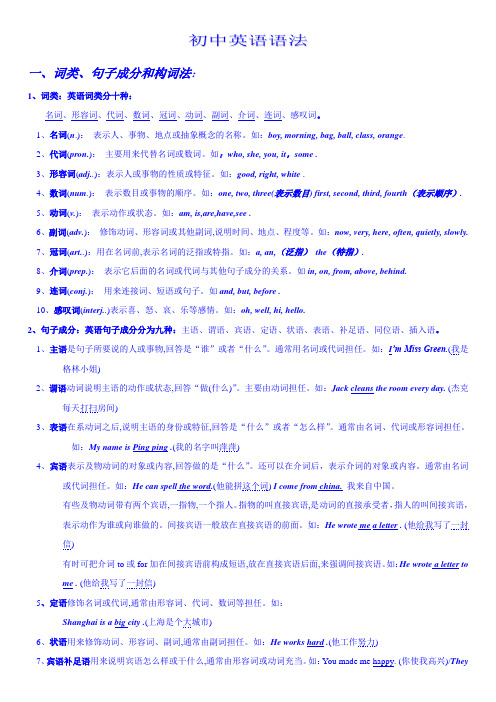
初中英语语法一、词类、句子成分和构词法:1、词类:英语词类分十种:名词、形容词、代词、数词、冠词、动词、副词、介词、连词、感叹词。
1、名词(n.):表示人、事物、地点或抽象概念的名称。
如:boy, morning, bag, ball, class, orange.2、代词(pron.):主要用来代替名词或数词。
如:who, she, you, it,some .3、形容词(adj..):表示人或事物的性质或特征。
如:good, right, white .4、数词(num.):表示数目或事物的顺序。
如:one, two, three(表示数目) first, second, third, fourth(表示顺序).5、动词(v.):表示动作或状态。
如:am, is,are,have,see .6、副词(adv.):修饰动词、形容词或其他副词,说明时间、地点、程度等。
如:now, very, here, often, quietly, slowly.7、冠词(art..):用在名词前,表示名词的泛指或特指。
如:a, an,(泛指)the(特指).8、介词(prep.):表示它后面的名词或代词与其他句子成分的关系。
如in, on, from, above, behind.9、连词(conj.):用来连接词、短语或句子。
如and, but, before .10、感叹词(interj..)表示喜、怒、哀、乐等感情。
如:oh, well, hi, hello.2、句子成分:英语句子成分分为九种:主语、谓语、宾语、定语、状语、表语、补足语、同位语、插入语。
1、主语是句子所要说的人或事物,回答是“谁”或者“什么”。
通常用名词或代词担任。
如:I’m Miss Green.(我是格林小姐)2、谓语动词说明主语的动作或状态,回答“做(什么)”。
主要由动词担任。
如:Jack cleans the room every day. (杰克每天打扫房间)3、表语在系动词之后,说明主语的身份或特征,回答是“什么”或者“怎么样”。
初中英语知识框架结构按单元
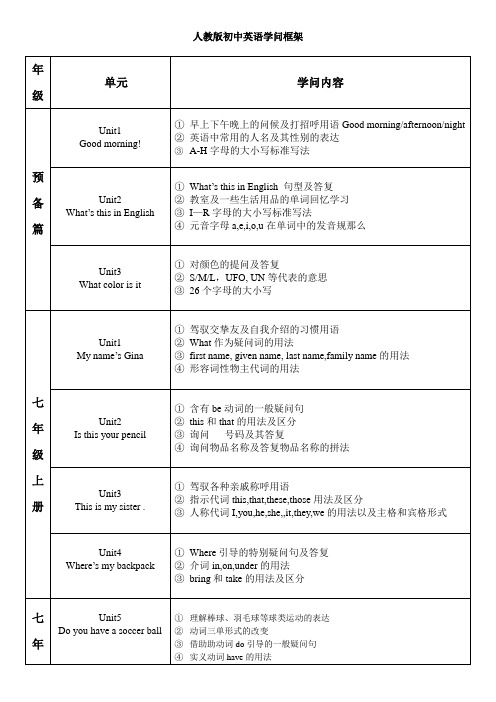
3first name, given name, last name,family name的用法
4形容词性物主代词的用法
Unit2
Is this your pencil
1含有be动词的一般疑问句
2this和that的用法及区分
3询问号码及其答复
4询问物品名称及答复物品名称的拼法
Unit14
Have you packed yet
1如今完成时的用法
2yet和already的区分
Unit15
We’re trying to save the manatees
1动词的时态复习
2有关环境爱护的语言
3living,,alive和live的区分
2驾驭反义疑问句
3驾驭As +形容词/副词的原级+as possible
Unit3
Teenagers should be allowed to choose their own clothes.
1被动语态
2驾驭Stop doing /stop to do的区分
3驾驭倒装语句So +be/助动词/情态动词+主语
hands
1be supposed to的用法
2理解各国风俗文化差异
3复习情态动词should的用法
④spend,take,pay和cost的用法区分
Unit13
Rainy days make me sad
1make的用法
2would rather的用法
3so…that和so that的区分
4感官动词taste的用法
九
年
级
Unit8
I will help clean the parks
- 1、下载文档前请自行甄别文档内容的完整性,平台不提供额外的编辑、内容补充、找答案等附加服务。
- 2、"仅部分预览"的文档,不可在线预览部分如存在完整性等问题,可反馈申请退款(可完整预览的文档不适用该条件!)。
- 3、如文档侵犯您的权益,请联系客服反馈,我们会尽快为您处理(人工客服工作时间:9:00-18:30)。
• 词类:代词(不定代词总复习)
•
动词(动词不定式总复习)•来自构词法• 句型:定语从句
整理ppt
7
改版教材特点
• 七年级上册偏基础,90及格,110优秀 • 七下偏难,学生难以适应 • 八年级知识结构复杂 • 九年级巩固基础,重难点强化
整理ppt
8
整理ppt
9
此课件下载可自行编辑修改,此课件供参考! 部分内容来源于网络,如有侵权请与我联系删除!感谢你的观看!
整理ppt
3
七年级下册
• 时态:现在进行时,一般过去时
• 词类:动词(情态动词,助动词)
•
介词(时间介词,地点介词...)
• 句型:祈使句,选择疑问句,特殊疑问句(全 部),there be结构
整理ppt
4
八年级上册
• 时态:一般将来时
• 词类:代词(不定代词)
•
形容词(比较级与最高级)
•
副词(比较级与最高级,频率副词)
•
动词(行为动词,系动词,助动词,情态动词)
•
冠词(定冠词与不定冠词用法深化)
•
连词(并列连词,从属连词)
• 句型:句子成分,句子类型
整理ppt
5
八年级下册
• 时态:过去进行时,现在完成时
• 词类:代词(反身代词)
•
动词(情态动词用法深化,动词不定式)
• 句型:状语从句
整理ppt
6
九年级
• 时态:过去完成时,过去完成进行时
初中英语知识框架
整理ppt
1
时态 词类 句型
整理ppt
2
七年级上册
• 时态:一般现在时
• 词类:名词(可数与不可数,所有格)
•
冠词(定冠词the,不定冠词a/an)
•
代词(人称代词,物主代词,指示代词)
•
数词(基数词,序数词)
•
介词(时间介词,方位介词)
• 句型:陈述句,一般疑问句,特殊疑问句(部分)
